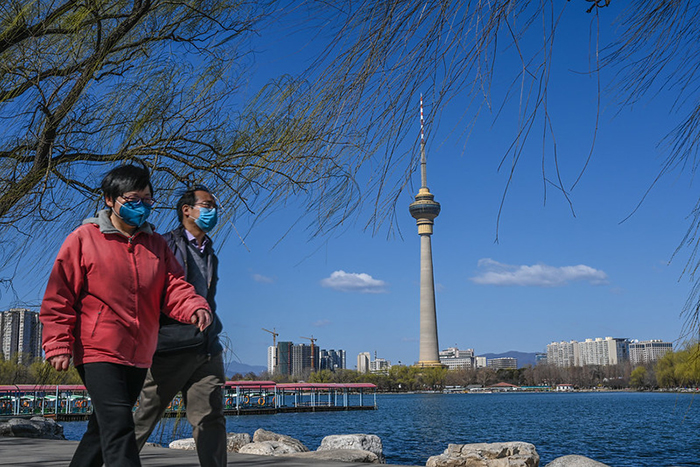Fourth Meeting of the GMS Urban Development Working Group

Parks and scenic areas in Beijing, PRC, have taken measures to control the number of visitors and limit them to 40% of the same period of previous years. Photo by ADB.
The Fourth Meeting of the Greater Mekong Subregion (GMS) Urban Development Working Group (UDWG-4) was held via web-based conferencing on 17 December 2020. Mr. Xu Jianping, Director General, Department of Regional Opening-up, National Development and Reform Commission (NDRC) of the People’s Republic of China (PRC), chaired the meeting with Mr. Antonio Ressano Garcia, Principal Urban Development Specialist, Southeast Asia Department Urban Development and Water Division (SEUW), Asian Development Bank (ADB), as co-chair. GMS UDWG representatives from Cambodia, PRC, Lao People’s Democratic Republic (PDR), Myanmar, Thailand, Viet Nam, and ADB participated in the event.
The meeting (i) discussed the impact of the coronavirus disease (COVID-19) on selected public utilities and how these have responded to address challenges on their operations, financial management and investments; (ii) discussed how COVID-19 has made city governments approach smart city development as well as the introduction of digital solutions for urban planning and service delivery; (iii) updated on the draft GMS Economic Cooperation Strategy 2030, the GMS medium-term COVID-19 response plan, and changes in the GMS Regional Investment Framework that are relevant to the UDWG; and (iv) agreed on the next steps for the UDWG, including the preparation of the next regional meeting.
The Chair noted that amid the COVID-19 pandemic situation, GMS countries have helped each other overcome the challenges and shared experiences in addressing the pandemic. He stated that the Government of PRC attaches great importance to urban development and regard it necessary for national modernization. He acknowledged the severe challenges that COVID-19 poses to urban governance and enjoined all to enhance urban capacity and resilience in tackling risks and challenges with the use of modern information technology, among others.
Urban Management and Provision of Basic Public Utility Services under COVID-19
Mr. Jiang Jinghao, Director, Department of Resource Conservation and Environmental Protection, NDRC spoke on the topic of urban medical waste management and facility construction under COVID-19. He pointed out that strengthening medical waste management is of great significance to prevent the spread of diseases, protect the ecological environment and safeguard people’s health. He shared the PRC’s response to the significant increase in medical waste generated due to COVID-19 outbreak in their country. The measures taken were as follows:
- Accelerate the construction of centralized medical waste disposal facilities under a two-year capacity building plan;
- Strengthen management of medical waste;
- Arrange central funds to support the construction of medical waste disposal facilities; and
- Strengthen supervision and monitoring to ensure implementation according to plan.
Mr. Alan Baird, Principal Urban Development Specialist, SEUW, ADB, presented on the topic of emerging lessons for water utilities from the COVID-19 pandemic in Asia Pacific. The lessons were based on findings of a survey conducted in Asia Pacific including GMS countries, to better understand impacts of COVID-19 on the operations of water utilities. A synthesis of survey responses, blended with best practices across the world, proposes the following lessons for consideration:
- Enhance resilience to shocks and stress;
- Improve water sector crisis preparedness;
- Develop utility response management (across all operational functions);
- Enhance wastewater-based epidemiology monitoring;
- Integrate WASH into public health policy;
- Undertake capacity and sector development;
- Conduct industry-wide knowledge sharing;
- Employ smart water management including digital technologies; and
- Enable remote working and decentralization.
Development of Smart Cities: Digital Solutions for COVID-19
Ms. Qiu Aijun, Deputy Director General, China Center for Urban Development, NDRC, PRC, presented their experience on Smart City Development and Digital Anti-epidemic Fight. She explained that with PRC’s long-term development efforts on smart cities and digital economy, city governments were able to leverage science and technology in pandemic prevention and control. The accumulated experience in using big data, artificial intelligence (AI), the Internet and other new-generation information technology was useful and replicated for pandemic prevention and control, effective treatment, livelihood protection, orderly production recovery and urban governance. She recommended that GMS countries accelerate planning and development of their internet and communication infrastructure, develop convenient and smart applications to meet the needs of residents, and popularize the use of smart terminals towards an improved urban development and governance.
Updates on the GMS Program
Ms. Pinsuda Alexander, Economist, Regional Cooperation and Operations Coordination Division, SERD, ADB, presented updates on the GMS Program particularly on the proposed new GMS Economic Cooperation Program Strategic Framework 2030 (GMS 2030), GMS COVID–19 Response and Recovery Plan 2021–2023 (GMS COVID-19 Plan) and the GMS Regional Investment Framework (RIF) 2022: Third Progress Report and Update, focusing on sections relevant to urban development.
Next Steps
The Government of Lao PDR will host the working group meetings in 2021. The Secretariat will coordinate with relevant ministries of the Lao PDR on hosting arrangements, including meeting format and agenda. Dates and topics for discussion will be shared soon.
Last Updated: 20 March 2021
